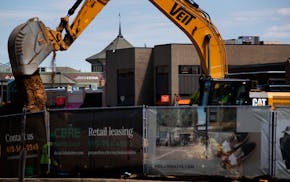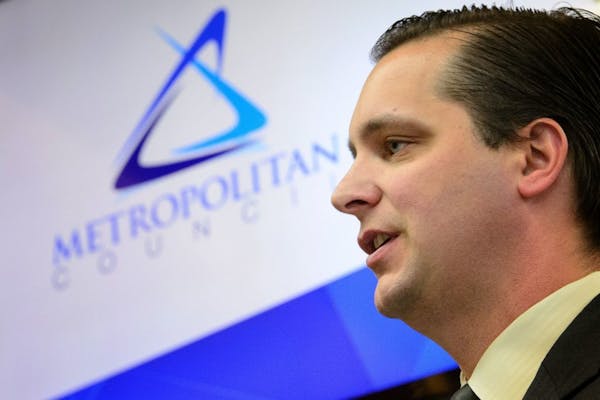The controversial Southwest light-rail line that would link Minneapolis to Eden Prairie has yet to break ground and critical state funding for the $1.77 billion project remains unclear, but that has not stopped regional transit officials from busily laying the groundwork for a fourth line.
The Bottineau rail line would be an extension of the existing Blue Line, running north from Minneapolis to Brooklyn Park. The project already has a preliminary price tag of $1 billion, and could find itself plagued by many of the same issues that have driven up costs on the Southwest project, including concerns over wetlands, railroad right of way and political opposition.
While only 1 percent of Bottineau's preliminary environmental work is complete, the general footprint and plans for up to 11 stations along north Minneapolis, Robbinsdale, Golden Valley, Crystal and Brooklyn Park have quietly emerged.
"When the original estimate was done, it was from a very high level," said Dan Soler, Bottineau's project director. "We will continue to refine [the cost] as we know more," A firm budget number won't come until late 2016 for the line, which is expected to open in 2021.
Cost is a touchy topic for the Metropolitan Council, the regional planning agency overseeing the project. When the Southwest line completed environmental and engineering work last spring, the price had ballooned by $341 million, due in part to poor soil conditions, additional work needed on wetlands, and higher property acquisition costs.
All those factors could bedevil Bottineau, as well.
Serious questions also remain about whether the state will ante up its 10 percent share for both the Southwest and Bottineau projects. Some Republican and outstate legislators see light rail as a metro-area boondoggle and are loathe to support it. It didn't help that Southwest's costs increased — even though stakeholders subsequently cut $250 million and raised an extra $12.5 million in cash from local coffers to help save it.
Met Council Chair Adam Duininck is optimistic lawmakers will come around on a broader transportation package next legislative session that includes transit funding, something that didn't happen this year.
"Either we do something big and ambitious next year, or there will be consequences," he said. "If it's status quo for another year, we're talking about lost time, lost opportunity and we could lose our priority in the federal funding queue." The Federal Transit Administration is expected to pay roughly half for both lines.
Because it's further along in planning, Southwest funding likely will dominate transit talk in the next session, but Bottineau is expected to follow with a big push in 2017. Given the animosity of some toward transit, it's possible Bottineau could be the last light-rail line built in the Twin Cities.
Tough negotiations
Eight of the 13 miles along the Bottineau route are located along the Monticello spur — a freight corridor owned by BNSF Railway Co. Metro Transit plans to reconstruct the rail right of way to make room for two light-rail cars and a single freight line. That will require Metro Transit to negotiate a deal to buy part of BNSF's property.
In an Aug. 5 letter to Metro Transit officials, BNSF Assistant Vice President DJ Mitchell II expressed "several long-standing concerns" about the proposed shared arrangement for Bottineau, as well as a small portion of the Southwest route.
Stating flatly that the company will not incur any increased costs related to a passenger project, Mitchell said BNSF needs to preserve enough room along the route to permit a second track for future expansion.
BNSF Spokeswoman Amy McBeth said one train a day travels along the spur, but that could "change at any time for a number of reasons, including changes in customers being served and in the overall economy."
Mitchell also said, "the region's level of support for our freight network is unclear," citing legislation that calls for railroads to pay for grade separations at oil train crossings, and a proposed property tax hike.
Rep. Frank Hornstein, DFL-Minneapolis, who sponsored the grade-separation bill, said legislation has "nothing to do with technical issues that need to be worked out between Met Council and BNSF for Bottineau. It seems like a threat, which should be rejected."
Cities need to consent
The Southwest line encountered early opposition from St. Louis Park and Minneapolis over its planned route. Both required extensive negotiations to resolve, and the proposed pathway through the Kenilworth corridor in Minneapolis has prompted litigation by a group of well-financed opponents. That lawsuit, filed by the Lakes & Parks Alliance, and another lodged by residents in Minnetonka, are pending in federal court.
Similar litigation has not cropped up for Bottineau — so far. Soler, who led the Central Corridor Green Line project, said "we're not hearing anything about that right now. But, who knows? We believe we're covering all our bases."
State law calls for each city along the line to hold public hearings and approve the plan, a process that proved contentious in Minneapolis for Southwest. So far, it appears that the five cities along the Bottineau line support it, although these "municipal consent" hearings won't occur until sometime next year.
That's not to say the project is universally beloved.
John Jordan, a Brooklyn Park city councilman, said he opposes the line's planned pathway along West Broadway over safety concerns. "It's largely a residential area, with a lot of kids," he said. "There's a McDonald's, Target and Cub there that attract people who don't always use the crosswalks. Plus, they'll be taking some homes, and those left will be very close to it."
Jordan also said he opposes light rail philosophically because "it's too expensive and we don't have the density to really make it a viable option in the Twin Cities."
Janet Moore • 612-673-7752

Will 'shotgun only' zone for deer in southern Minnesota be abolished?
One killed in head-on crash in Coon Rapids

Edina could see first zoning update in 50 years

